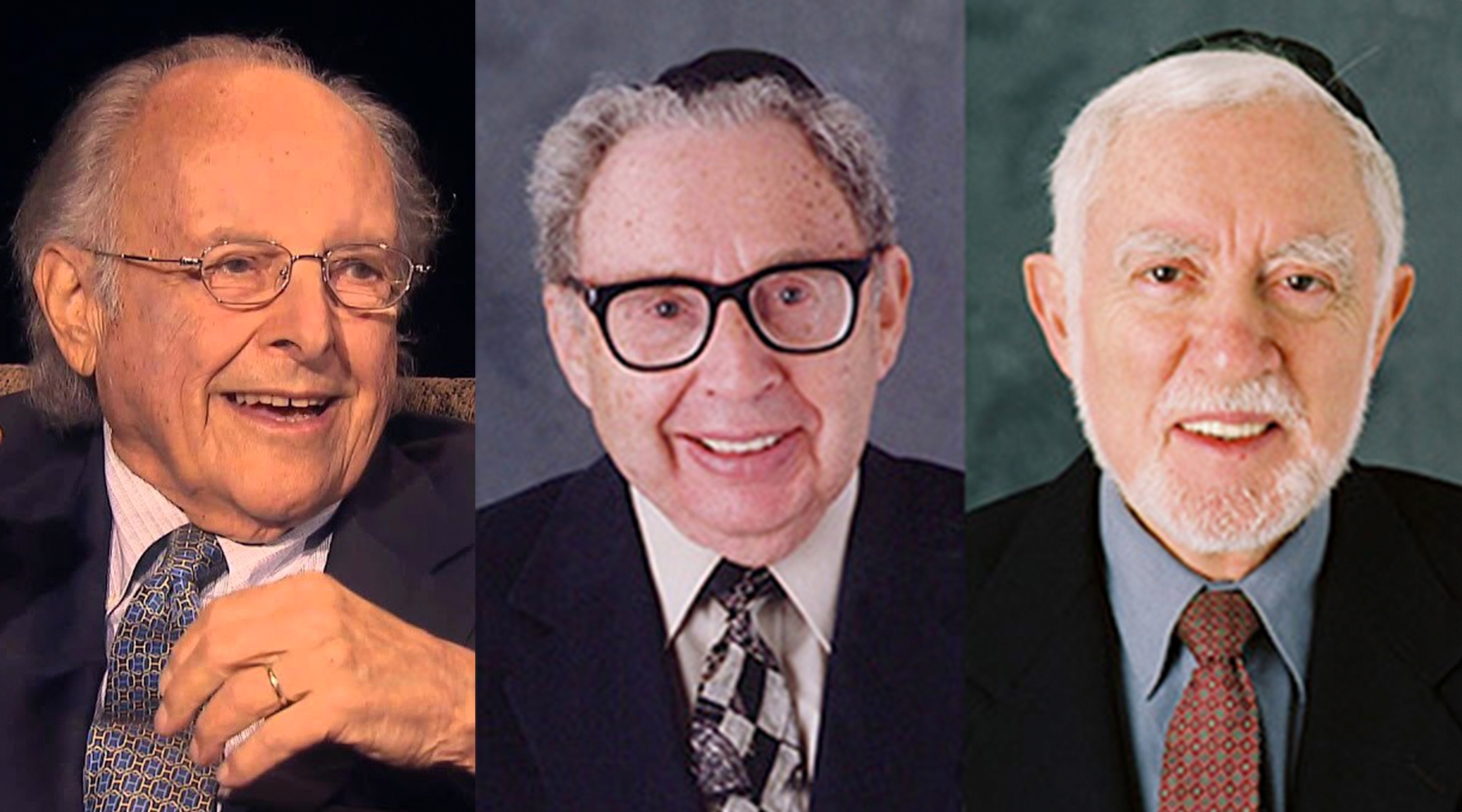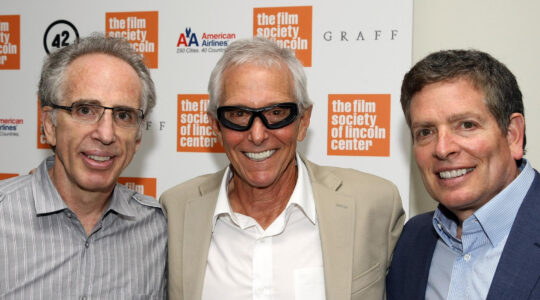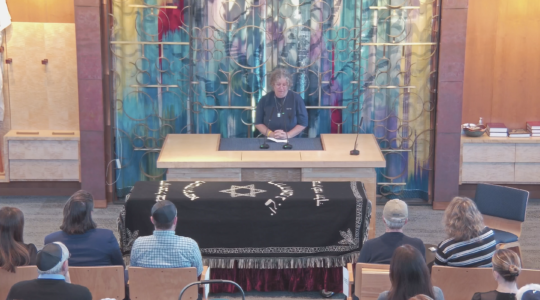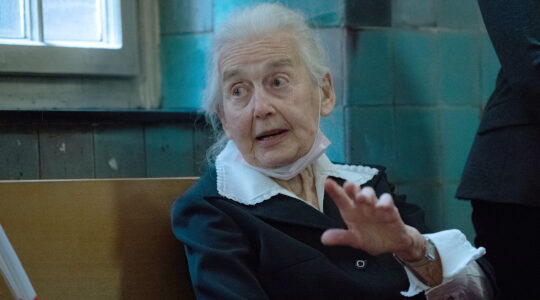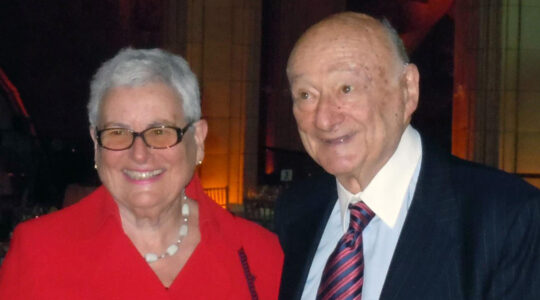(JTA) — The Jewish Theological Seminary community is in mourning after three revered scholars long associated with the Conservative movement flagship died within days of each other.
Rabbi Israel Francus, who died Nov. 15 at age 96, and Rabbi Avraham Holtz, who died the same day at age 89, were both professors emeritus at the seminary — Francus as a longtime professor of Talmudic exegesis and Holtz in Hebrew literature.
Samuel Klagsbrun, who died Nov. 11 at age 91, was a psychiatrist and medical director of a private psychiatric hospital who for many years taught pastoral psychiatry to JTS students, and was instrumental in the creation, in 2009, of the seminary’s Center for Pastoral Education.
“Together, these three individuals reflect the breadth and depth of a JTS education,” Shuly Rubin Schwartz, the chancellor of JTS, said in a statement to the Jewish Telegraphic Agency. She noted that the three represented “the importance JTS attaches to educating not only the texts, history, and ideas of our people but also ensuring that future clergy were attuned to the heart, soul, and emotional lives of the Jews they would serve.”
Klagsbrun was perhaps the best known of the three outside of the seminary. The founder and executive medical director of Four Winds Hospitals in Katonah and Saratoga Springs, New York, he sought to reconcile the sometimes competing claims of religion and psychiatry, telling the New York Times in 2002, ”Psychiatrists were not paying any attention to religion or the spiritual aspects of life. And religion and religious values and backgrounds and spiritual dimensions are extremely important to people’s dynamics.”
He was also known for his work on psychological challenges facing cancer patients, his approaches to the ethics of death and dying, and a devotion to improving hospice care.
Born in Antwerp, Belgium, Klagsbrun emigrated with his parents to Manhattan, where he attended the Ramaz school, Yeshiva High School and City College. He received a Seminary College degree from JTS in 1954 before earning a medical degree from Chicago Medical School.
Klagsbrun was a founding member of Or Zarua, a Conservative congregation on the Upper East Side of Manhattan. He and his wife, the writer Francine Klagsbrun, a longtime columnist for the New York Jewish Week and the author of a recent biography of Golda Meir, met at Camp Ramah in the Poconos. She survives him, as does his daughter Sarah and son-in-law Eric Weinstein, and three grandchildren.
Holtz, the Simon H. Fabian Professor Emeritus of Hebrew Literature at JTS, was an authority on the Nobel-prize winning Israeli author S.Y. Agnon, producing, in 1995, a fully annotated and illustrated edition of Agnon’s masterwork “Hakhnasat Kallah,” or “The Bridal Canopy.”
In an interview with fellow Agnon scholar Jeffrey Saks in 2016, he explained why he modeled the annotated edition on the “Mikraot Gedolot,” a collection of classic rabbinic commentaries of the Bible — a decision that drew the scorn of traditionalists. “You can understand the whole attack by the fact that I came from [the] Jewish Theological Seminary,” said Holtz. “Only somebody coming from the Seminary would do such a sinful thing.”
Holtz was ordained and received his doctorate at JTS, where he also taught and served as chair of its department of Hebrew Literature and as dean of Academic Development. In a eulogy, Schwartz described Holtz as “part of a cadre of younger, native-born scholars teaching at JTS in the 1960s who in retrospect proved to be harbingers of the explosion of Jewish studies in higher education in the United States.”
Schwartz also quoted professor emeritus Judith Hauptman, who remembered him as having a command of Hebrew that was “so excellent and fluent that it could make your jaw drop. It was a privilege to read any text with him — whether it was a classic poem, a midrash, or an Agnon story. For Avraham the literature was his life’s blood.”
Holtz is survived by Toby Esther Berger, a retired senior lecture in chemistry at Barnard College, four children — Shalom Eliezer Holtz, Razelle Weinstein, Mordecai Yehiel Holtz and Miriam Malka Craime — their spouses and and numerous grandchildren.
A native of Poland and survivor of Auschwitz, Israel Francus was the Judge Abraham Lieberman Distinguished Service Professor of Talmudic Exegesis at JTS, where he taught generations of students in the close reading of the rabbinic literature at the heart of a rabbi’s education. Among the many tributes shared on social media following his death, Rabbi Josh Gruenberg of Baltimore’s Chizuk Amuno Congregation spoke about the “joy” of taking Francus’ class.
“In the span of just one class, he could make you laugh to your core with is lightning-fast quips, remind you of the great care rabbis have always taken in understanding our tradition, lift you up with a compliment that inspired you to work harder, and make you cry as he shared heartfelt stories and lessons on the occasions of his teachers’ yahrzeits,” said Gruenberg.
Francus received bachelor’s and master’s degrees from both Columbia University and JTS as one of the first two graduates of JTS’s joint program with Columbia. He was also ordained at JTS.
His published works include an analysis of a commentary on a Talmudic tractate by the 16th-century rabbi Elazar Azikri, as well as over 40 articles published in Israeli journals. An article on how to interpret a sugya — the essential literary unit of the Talmud — will be published posthumously in the journal Sinai.
“My father was modest about his accomplishments,” Francus’ son Yitzchak, an attorney living in Pittsburgh, said at his father’s funeral, held Nov. 15 at JTS. “Not modest in the sense of self-abnegation, or in the showy sense of conceit internalized, but modest in the perspectival sense. He stood in awe of the Talmud. For him, simply participating in its eternal discourse was an almost unimaginable honor.”
Francus is is survived by his wife, Tova (Shulzinger) Francus, an immunologist; his sons Yoseff, Yitzchak and Yaacov Francus; 10 grandchildren, and one great-granddaughter.
Holtz and Francus were both buried in Israel.
JTA has documented Jewish history in real-time for over a century. Keep our journalism strong by joining us in supporting independent, award-winning reporting.
